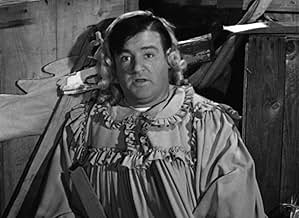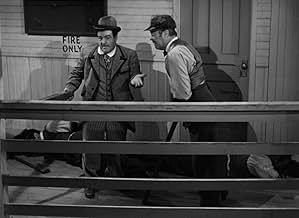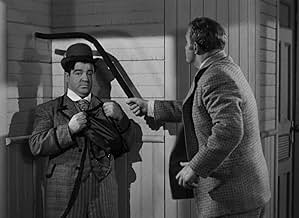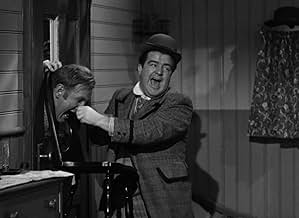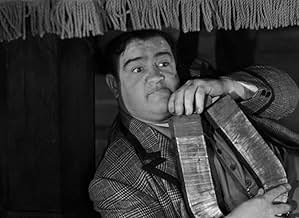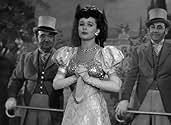Füge eine Handlung in deiner Sprache hinzuWhen their captain is swindled out of his riverboat by a trio of gamblers, stage show star Abbott and his bumbling sidekick Costello must put things right.When their captain is swindled out of his riverboat by a trio of gamblers, stage show star Abbott and his bumbling sidekick Costello must put things right.When their captain is swindled out of his riverboat by a trio of gamblers, stage show star Abbott and his bumbling sidekick Costello must put things right.
- Specialty Dancer
- (Nicht genannt)
- Card Player
- (Nicht genannt)
- Rainbow Four Member
- (Nicht genannt)
- Baby
- (Nicht genannt)
- Townsman
- (Nicht genannt)
- Girl in Garter Gag
- (Nicht genannt)
- Gambler
- (Nicht genannt)
- Croupier
- (Nicht genannt)
- Gilded Cage Waiter
- (Nicht genannt)
- Specialty Dancer
- (Nicht genannt)
Empfohlene Bewertungen
The riverboat theme used here is appropriate as the naive Costello's comedy bounces well off the bad guys schemes. There are some great throw away lines in the film in addition to the Whose On First routine which today they are most remembered for.
Their supporting cast here is fairly good. The production qualities are good and the music works into the film better than some of their films where the music stops the action. Costello borrows the Marx Brothers Horse Feathers routine about throwing a drowning man a life saver. While even Costello can't perform a the frantic pace the brothers did, he is quite energetic and funny here.
This film falls at a moment when they were starting to loose their audience. Unfortunately, Bud and Lou's biggest success came during World War II. A nation needing to be cheered up and needing a morale boost fell for Abbott and Costello during those four horrible years. They were the morale boosters in chief and they became the most popular and the most rich actors in Hollywood during those years. But, as the war began to wind down, so did the popularity of the boys. They needed to start making changes and you see this happening in a lot of their films moving forward into the 1950s.
When this film was released in 1945, Germany had already surrendered a few months before and Japan was just a few months away from surrendering. The war was over and the feelings and attitudes of a post-war America were beginning to change. Also, television was just on the horizon. People were looking towards other things to do or see.
As this film opens up, Dexter and Sabastian (Bud and Lou), get work on a showboat named the River Queen. Dexter is an actor and Sabastian is his trusted "assistant". The owner of the River Queen, Captain Sam Jackson (Henry Travers), falls into the scheme of a handful of con artists, who are bent on getting the showboat for themselves, so they can run their illegal gambling casino. This is something Sam wants nothing to do with. It takes the help of the boys to come help save the Captain and his daughter, Caroline (Lois Collier), from these dastardly criminals.
What sets this film apart from a lot of Abbott and Costello's films from the same time period is this one features a smorgasbord of their different and classic acts, including their best, "Who's on First". Another thing a person needs to know about Abbott and Costello is their talent, their act and all their skits grew out of the vaudeville era. Working in vaudeville meant you were working with everybody. All the talent shared their acts, jokes and skits with each other. It was part of the vaudeville culture. So, when you see the Three Stooges, or Wheeler and Woolsey or even Martin and Lewis, do the same joke or skit that Bud and Lou did, that shouldn't be considered a negative. It's how things were.
It is true this film is not a great one. There are moments that seem sloppy in their design. It makes you wonder if the whole process was becoming stale to whoever was involved in the film or was it just becoming overly repetitious. This is most evident during the "duck shoot" skit. We may be laughing at the absurdity of it all, but we also aren't buying that any of this could possibly fool anyone. What was interesting about all of this, is watching this tired, formulaic development, that would eventually become Abbott and Costello's main direction once they get to television in the 1950s. Foreshadowing maybe?
This film is still worth a watch. It has some rough edges and might seem a little plastic in its design, but overall is a delight to see. They give us one skit after another. They intertwine all of that with a little story and textbook characters (for this kind of a romp), that get us to the end, but adults might seem slightly robbed, because there is a childish nature to some of the performances that happen in the film. But, who cares? It's Abbott and Costello, who were legends of their day. They didn't need to answer to nobody. They were the richest guys in Hollywood. You don't do that when you are making bad stuff. Plus, anything with "Who's on First", is a gold mine.
6.2 (D+ MyGrade) = 6 IMDB.
There's also a routine reminiscent of the famous mirror scene from "Duck Soup", and a scene where Costello's shooting at some ducks that might have inspired the camping trip episode on "I Love Lucy".
There's a familiar face from a now classic Christmas movie, as the showboat captain is played by Henry Travers, known for his role as the angel, Clarence in "It's a Wonderful Life".
There's enough here to hold your interest and keep you laughing.
But the sketches are priceless, in particular the rehearsal sketch and the immortal WHO'S ON FIRST.
In another review I compared Bud and Lou with Stan Laurel and Oliver Hardy. Bud Abbott's persona is not like Oliver Hardy's, although both try to dominate (Bud, with more success) Lou and Stan. Ollie is quite self-important, but is (actually) as stupid as Stan is. His self-delusion is just added on the cake. But Bud normally is street smarter, and bullies Lou. He barks orders left and right to him, orders that Lou thinks he understands. The orders are in abbreviated form, using slang or short form descriptions that most people will understand, and that is doomed to confuse Lou.
In the rehearsal sketch, Lou is studying a song he wants to sing in the showboat show, and if he does it well Captain Sam will let him sing it. Bud is on stage helping direct the putting up of varying scenery. He is asked for help by Lou to help him, and to shut the little guy up, he half-heartedly agrees to do so. But he is concentrating on that scenery. So we hear Lou start singing "MY BONNIE LIES OVER THE OCEAN", and after awhile he hears Bud yelling "Higher", "HIGHER", "LOWER, etc. Of course Lou is not watching Bud directing the men with the scenery, and Lou raises and lowers his voice accordingly. The vast alterations eventually is too much for Lou, who falls into the orchestra pit while an oblivious Bud walks off stage.
The other sequence is even greater. If you say "Abbott & Costello" to anyone today, the phrase "Who's on First" comes up immediately. No other dialog of theirs is as memorable (not even that delectable skit about Niagara Falls). Indeed, due to the popularity of Baseball, the skit is honored in Cooperstown's Baseball Hall of Fame, and Bud and Lou are members of the Hall of Fame too (without being baseball players). No other comedy team approached such a signature dialog - for instance Groucho and Chico Marx did several fractured English discussions, such as "Why a Duck" in COCONUTS, but the dialog is not central to their reputations. Similarly Laurel & Hardy's use of "two peas in a pod" in THE SONS OF THE DESERT is classic, but not central to their reputation.
"Who's On First" works on the same principle as the rehearsal skit - Lou cannot follow the statements fed him by Bud, and yet Bud is not being intentionally difficult. He starts by explaining the crazy nicknames of the baseball players these days, and Lou never makes the logical connection that the nicknames can be terms like "who", "what", "I don't know", and "I don't care". Once I saw someone rewrite Abbott's description as "Mr. Who is on First base; Mr. What is on Second Base...etc." Actually the effect on Lou would probably be minimal: How many people have surnames like "Who" (this was years before the British Doctor in the futuristic tardis showed up). Moreover, they are nicknames, not proper names like "Unconditional Surrender" Grant, or "Old Hickory" Jackson. So it can't be "Mr. Who" or "Mr. I Don't Care".
Interestingly few people seem to be noting that the nicknames don't say much for these players. "Who", "What", "I Don't Know", "I Don't Care", "Today", "Tomorrow" suggests that each of the players has a failing, like "Who" suggests he is confused at the strategy of the team (who is going to be targeted by his team's pitcher on the opposite team), "What" suggests a lack of understanding orders from the team coach or captain, "I Don't Know" suggests confusion, and "I Don't care (the short stop) doesn't give a damn to be on the scene of where the ball falls when he is needed. Lou's willingness to play on the team, which we accept as his fondness of the game (and his constant image of being childlike) may actually have some merit - he may be a better player than these others.
The highpoint (to me) of the dialog is when, giving up momentarily, trying to comprehend Bud's apparent double-talk, Lou shows he can repeat the line-up's name, and describe a baseball play perfectly. Bud shows his approval of this rational approach - only to hear Lou scream out he doesn't understand what he himself has been talking about. To me that was the perfect conclusion of the great confusion known as "Who's on First".
In recent years stores have offered mechanical representations of political and entertainment figures reciting comments they are supposed to be famous for. There was one pair together: of Bud and Lou in costume from THE NAUGHTY NINETIES (Bud wearing the baseball outfit of non-existent St. Louis Wolves), reciting Who's On First. That is immortality folks.
Wusstest du schon
- WissenswertesThe scene of Bud Abbott and Lou Costello doing their classic "Who's on First" routine is run continuously at the National Baseball Hall of Fame in Cooperstown, NY. It is regarded as the best version of this routine in existence.
- PatzerCrew members can be heard laughing during the "Who's On First?" routine (who could blame them?)
- Zitate
Dexter Broadhurst: Strange as it may seem, they give ball players nowadays very peculiar names.
Sebastian Dinwiddle: Funny names?
Dexter Broadhurst: Nicknames. Nicknames.
Sebastian Dinwiddle: Not - not as funny as my name - Sebastian Dinwiddie.
Dexter Broadhurst: Oh, yes, yes, yes!
Sebastian Dinwiddle: Funnier than that?
Dexter Broadhurst: Oh, absolutely. Yes. Now, on the St. Louis team we have Who's on first, What's on second, I Don't Know's on third...
Sebastian Dinwiddle: That's what I want to find out. I want you to tell me the names of the fellows on the St. Louis team.
Dexter Broadhurst: I'm telling you. Who's on first, What's on second, I Don't Know's on third...
Sebastian Dinwiddle: You know the fellows' names?
Dexter Broadhurst: Yes.
Sebastian Dinwiddle: Well, then, who's playin' first?
Dexter Broadhurst: Yes.
Sebastian Dinwiddle: I mean the fellow's name on first base.
Dexter Broadhurst: Who.
Sebastian Dinwiddle: The fellow playin' first base for St. Louis.
Dexter Broadhurst: Who.
Sebastian Dinwiddle: The guy on first base.
Dexter Broadhurst: Who is on first.
Sebastian Dinwiddle: Well, what are you askin' me for?
Dexter Broadhurst: I'm not asking you - I'm telling you. Who is on first.
Sebastian Dinwiddle: I'm asking *you* who's on first!
Dexter Broadhurst: That's the man's name!
Sebastian Dinwiddle: That's whose name?
Dexter Broadhurst: Yes.
- Crazy CreditsIn many of Abbott and Costello's films, their faces are visible through the "O"'s in their names. In this one, only Costello's face is seen at first; then he silently calls, "Hey, Abb-bott!," and Abbott's face appears.
- VerbindungenEdited into Diminishing Returns: It (2017)
- SoundtracksRolling Down the River
(uncredited)
Music by Edgar Fairchild
Lyrics by Jack Brooks
Played at the first scene and sung offscreen by an unidentified male chorus
Top-Auswahl
- How long is The Naughty Nineties?Powered by Alexa
Details
- Erscheinungsdatum
- Herkunftsland
- Sprache
- Auch bekannt als
- Håll ångan oppe!
- Drehorte
- Produktionsfirma
- Weitere beteiligte Unternehmen bei IMDbPro anzeigen
- Laufzeit
- 1 Std. 16 Min.(76 min)
- Farbe
- Seitenverhältnis
- 1.37 : 1

